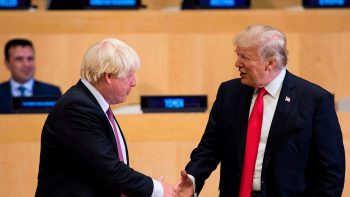TEXT OF STORY
Kai Ryssdal: President Bush spent some time working the phones today. He was on the line with European leaders trying to coordinate a global response to the credit crisis. Finance ministers from the Group of seven industrialized countries are set to meet in Washington at the end of this week. The White House said today, by the way, the President’s not opposed to tacking a leaders meeting on to that.
Our looming presidential election is playing into the economic mix too, especially for Americans living overseas. There are about a quarter of a million American ex-pats in the United Kingdom. In today’s installment of our election series “Interested Parties,” Marketplace’s Stephen Beard gives us a bird’s eye view of their economic concerns.
Stephen Beard: [sound of American football game on TV] In this pub in West London, an ex-pat dolefully watches an American football game on TV. But it’s not the game that’s getting him down. Matt Peak from Texas is depressed about the American economy.
Matt Peak: Actually, I’m kind of worried because I’m trying to sell my house right now back in Texas. It’s a little iffy, a little iffy.
Peak is in his early 30s and teaches school here. The turmoil of recent weeks has convinced him to stay put.
Beard: Economically, do you feel more secure here than perhaps you would feel in the U.S.?
Oh much so, much so. America. Everything back home, it’s not a place I want to be right now. I love it to death, but with what’s going on in the American economy, I’d rather stay here.
Nicole Hayes, who’s at the pub too, feels the same. Nicole is a 29-year-old office worker from Boston. She’s just married an Englishman. What would it take for them to move back to the U.S.?
Nicole Hayes: What it would need, with what I feel now, the best life we can have as a couple and eventually, hopefully as a family. So to me, the country would have to be a lot more stable, and I would have to feel a lot more secure.
Though the U.K. is lurching into recession, Nicole says it feels less volatile and safer here. And she particularly likes the state-run National Health Service.
Hayes: I couldn’t believe it when I came here, because I don’t have to bring my wallet to the doctors with me. I know the U.K. is not considered to have the best system. but when you come from a place where there’s no system at all, I think it’s easy to be really surprised and impressed with it.
Beard: The free health care that you get from the NHS is important to you then?
Hayes: Definitely, it definitely is important.
[office sounds] From his office high up over London’s financial district, Bob Annibale has different concerns. He’s a global director of an American institution. He lives here and not in his native New York because he’s gay, and he has a British civil partnership. That gives him and his partner the same rights as a married couple.
Bob Annibale: That means that we can live and work anywhere in the European Union completely in a normal situation from tax perspective, from immigration perspective, from divorce perspective or housing rights or employment benefits, but not the United States.
Beard: So that would have to change. Civil partnerships would have to be recognized in the states before you would go back and live there with your partner.
Annibale: Yes, I mean, today, my family isn’t recognized there.
Gwen Joseph plans to go back to Michigan. She and her husband aim to retire in about four years. Gwen says she would like the U.S. government follow the British example and provide better public services from health care and education to taking care of the homeless.
Gwen Joseph: I think, in general, people here are much more interested in trying to help out and make sure that everyone is taken care of.
But now, she’s afraid the U.S. won’t be able to afford better public services. And she’s worried the Wall Street rescue package will further swell America’s national debt.
Joseph: We have two children who are adults that have families. We have grandchildren. And I don’t want my granddaughter to be paying off debt that we’re incurring now.
All of these ex-pats are anxious about the state of the U.S., but they all believe America will pull through the crisis. And one way or another, all of them say they want to go back. One day.
In London, this is Stephen Beard for Marketplace.
There’s a lot happening in the world. Through it all, Marketplace is here for you.
You rely on Marketplace to break down the world’s events and tell you how it affects you in a fact-based, approachable way. We rely on your financial support to keep making that possible.
Your donation today powers the independent journalism that you rely on. For just $5/month, you can help sustain Marketplace so we can keep reporting on the things that matter to you.


















